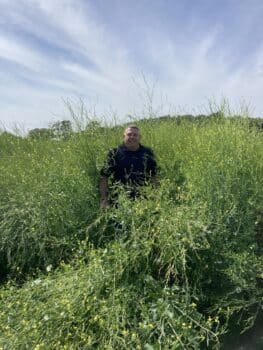As Nuseed Carinata global production increases, the plan is to expand commercial production to the United States over the coming years. In the U.S., Carinata’s low-carbon feedstock can be used in domestic biofuel production and the program’s carbon savings will also be an advantage to local governments and companies working towards carbon reduction targets and policies.
A successful increase in cover crop adoption will require education, agronomic support and economic return on investment.
According to the most recent Sustainable Agriculture Research and Education (SARE) 2019-2020 cover crop survey, farmers who used cover crops in 2019 ranked yield benefits following cover crops high. Additionally, the survey indicated that growers were also motivated by cover crops’ abilities to deliver other benefits, like weed control, soil health, erosion control, livestock grazing and more. Growers indicated reduced herbicide costs in soybeans (38.7 percent of producers), corn (39 percent), wheat (31.9 percent of producers) and cotton (70.6 percent). The most common level of savings was $6 to $10 per acre. Among the farmers who did not report a cut in herbicide applications or costs, a majority still reported improved weed control with the use of cover crops.
The prospect of introducing a new contract cover crop to U.S. growers, with on-farm agronomic, economic, sustainability and carbon reduction benefits, is exciting and challenging.
“Once growers understand all the benefits, including additional income from existing farmland, and know the Nuseed team is there to support them, they are keen to take the next step, adding Nuseed Carinata to their crop rotations,” says Justin Ingalls, Nuseed Commercial Sales Lead.

